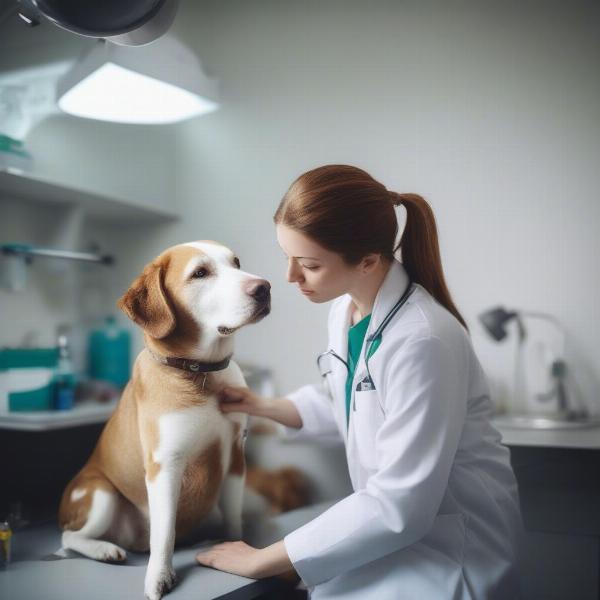Cheesy bacon hot dogs might sound like a delicious indulgence, but are they safe for your furry friend? While the combination of cheese, bacon, and hot dogs is a tempting treat for humans, it’s important to remember that dogs have different dietary needs. This article will delve into the potential risks and benefits of sharing this human food with your canine companion.
Can Dogs Eat Cheesy Bacon Hot Dogs?
While a small nibble of cheese or a tiny piece of cooked bacon is unlikely to cause significant harm to a healthy adult dog, hot dogs, especially when combined with cheese and bacon, are generally not recommended. Hot dogs are high in sodium and fat, which can contribute to pancreatitis, obesity, and other health problems in dogs. Bacon adds even more fat and salt to the mix, increasing the risk of these issues. Cheese, while generally safe in small quantities, can be problematic for lactose-intolerant dogs. The combination of these three ingredients in a cheesy bacon hot dog creates a calorie-dense, high-sodium, and high-fat treat that can be detrimental to a dog’s health.
The Risks of Feeding Your Dog Cheesy Bacon Hot Dogs
The high sodium content in hot dogs can lead to excessive thirst and urination, and in severe cases, sodium ion poisoning. The high fat content in both bacon and hot dogs can upset a dog’s digestive system, potentially causing vomiting, diarrhea, and pancreatitis, a serious inflammation of the pancreas. Regular consumption of high-fat foods can also contribute to obesity, which can exacerbate other health problems such as arthritis and heart disease. Certain seasonings often used in hot dogs, like onion and garlic powder, are toxic to dogs and can damage their red blood cells.
Healthier Alternatives to Cheesy Bacon Hot Dogs
Instead of offering your dog cheesy bacon hot dogs, consider healthier alternatives that are specifically formulated for their nutritional needs. Dog-friendly treats are readily available and come in a variety of flavors and textures. You can also offer small pieces of cooked, unseasoned lean meats like chicken or turkey, along with dog-safe fruits and vegetables such as carrots, apples, and blueberries. Always consult with your veterinarian before introducing new foods to your dog’s diet.
What to Do If Your Dog Eats a Cheesy Bacon Hot Dog
If your dog accidentally consumes a cheesy bacon hot dog, monitor them closely for any signs of distress, such as vomiting, diarrhea, or lethargy. If you notice any of these symptoms, contact your veterinarian immediately. A single incident is unlikely to cause long-term damage, but it’s crucial to observe your pet for any adverse reactions.
 Veterinarian examining a dog
Veterinarian examining a dog
Conclusion
While cheesy bacon hot dogs might be a tempting treat to share with your furry friend, they pose several health risks due to their high sodium and fat content. Opt for healthier alternatives and always consult your veterinarian about your dog’s diet. Your dog’s health and well-being depend on the choices you make.
FAQ
- Can I give my dog just a small piece of a cheesy bacon hot dog? While a tiny bite is unlikely to cause serious harm, it’s best to avoid giving your dog any amount of cheesy bacon hot dogs.
- What are the signs of pancreatitis in dogs? Signs include vomiting, diarrhea, loss of appetite, lethargy, and abdominal pain.
- What are some healthy treats I can give my dog? Healthy treats include dog-friendly commercial treats, small pieces of cooked, unseasoned lean meats, and dog-safe fruits and vegetables.
- What should I do if my dog eats a whole cheesy bacon hot dog? Monitor your dog closely for any signs of distress and contact your veterinarian if you notice any unusual symptoms.
- Are there any types of hot dogs that are safe for dogs? No, even “low-sodium” hot dogs still contain more sodium than is healthy for a dog.
- Can I give my dog cheese instead of a cheesy bacon hot dog? Small amounts of cheese are generally safe for dogs, but avoid giving cheese to lactose-intolerant dogs.
- What are some other human foods that are toxic to dogs? Other toxic foods include chocolate, grapes, raisins, onions, and garlic.
ILM Dog is your go-to resource for expert advice on dog care and breeding. We offer guidance on everything from choosing the right breed to ensuring your dog’s health, training, nutrition, grooming, and overall well-being. Whether you’re a new dog owner or a seasoned expert, ILM Dog provides reliable, practical information to help you navigate every aspect of dog ownership. Learn more about our services and connect with our team of experts by emailing us at [email protected] or calling us at +44 20-3965-8624. For more insightful articles and resources, visit ILM Dog.